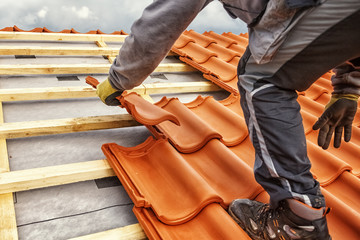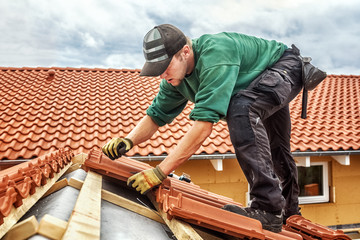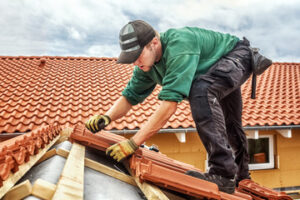Depending on the extent of the damage, roof repairs may involve resealing leaky spots, reinforcing structural elements, or addressing underlying issues like poor ventilation and insulation. After all repair work is complete, roofing professionals perform a final inspection to ensure that everything is watertight and secure.
Isolated roof damage is ideal candidates for repair — especially when it’s the result of weather or neglect. However, putting off needed repairs can lead to bigger problems down the road. Contact Roof Repair Christiana TN for professional help.
The shingles of a roof are the surface that protects the structure from moisture and weather. They’re made of several types, including asphalt shingles, wood shingles, and metal shingles. They’re often laid out in rows that overlap one another, which creates a path for water and moisture to drain from the roof into gutters. The integrity of a shingle roof depends on the proper installation and maintenance. This includes adequate ventilation and flashing to prevent moisture buildup, which can lead to leaks and rot. Flashing is needed at the joints of the shingle layer and at places where it meets or intersects other surfaces, such as chimneys, roof vents, and dormers. It’s important to use high-quality materials and ensure a watertight seal at these points.
Leaking roofs may have many causes, including damaged shingles or flashing, poor ventilation, and a lack of maintenance. Identifying and addressing these problems quickly can help prevent costly structural damage to the home. Often, a professional roofing contractor can conduct a thorough inspection and recommend the best course of action for repairs.
Shingles that are missing or curled indicate the need for repair or replacement. Missing shingles allow moisture to penetrate the roof and damage the insulation and interior structures. Curled shingles are more susceptible to wind damage and can become more brittle as they age.
To replace a shingle, carefully lift the edges of the surrounding shingles and remove the nails holding them in place. Carefully slide the new shingle into place, positioning it just below the overlapping shingle above. Secure the shingle with roofing nails and cover the nail heads with roofing cement. If necessary, trim the new shingle to fit the surrounding area.
A shingle that has become curled can usually be straightened by applying heat to the shingle with a propane torch. After the shingle is softened, it can be flattened using a utility knife or other tool. For a shingle with cracked or broken edges, you’ll need to apply roof cement to the edges of the shingle and in any gaps. Inspect the entire roof for cracks, holes, and other signs of damage. Then, you’ll be ready for the next step in your roof repair — fixing the leaks.
Flashing
Flashing is a thin strip of metal installed around roof penetrations like chimneys, vent pipes, skylights, and dormers to prevent water leaks. It’s usually made of rust-resistant materials like galvanized steel or aluminum, and it is sealed to the surface of the roof and to the surrounding cladding with a waterproof sealant. Flashing directs rainwater away from vulnerable areas of the roof, where water leaks can cause major damage.
Leaks are caused by cracks and seams in the roof’s structure or where different sections of the roof meet or intersect with other structures, like chimneys, vents, or skylights. The most important function of roof flashing is to prevent these leaks by creating a protective barrier that keeps moisture from seeping into the cracks and joints in the roof. Without proper flashing, water would leak into the ceilings and walls of a home, causing significant damage over time.
Roof flashing is often a hidden component in a roof’s structure, but it is essential for keeping the house safe and dry. A trained roofing professional can identify and repair any damaged or leaking flashing to protect the interior of the home and avoid costly repairs down the road.
Flashing can be made of a variety of materials, depending on the needs of the project. Galvanized steel is the most common flashing material, and it can be clad with copper or aluminum for a more attractive look. Colored flashing is also available, which can be matched to the color of the roof for a seamless look.
When installing flashing, it is critical to ensure that the flashing is overlapping and sealed correctly. If a gap is left open, water will leak into the building and create mold and mildew problems. Flashing should also be carefully inspected after installation to ensure that it is not leaking or cracked.
Flashing can be repaired or replaced by a qualified roofing contractor, and it should always be done by an experienced professional. Do-it-yourself roofers should steer clear of roof flashing repairs, as the process can be complicated and dangerous.
Gutters
Gutters are a key part of home roofing systems and work with downspouts to collect rainwater and direct it away from the foundation. They are designed to prevent soil erosion around the house’s foundation, which can lead to settlement over time, compromising the structural integrity of the building. Gutters also protect roofs, fascia boards, siding and exterior doors from water damage and mold.
Often referred to as eavestroughs, gutters are metal or plastic pipes that are attached to the fascia board, perpendicular to the roof. They are angled slightly to channel water into downspouts along the sides of the house. Gutters can help preserve the foundation of a house by preventing water damage to basements and crawl spaces, which can result in thousand-dollar repairs. They can also reduce the amount of water exposure that damages the paint and stain on a house’s siding.
In order to properly function, gutters must be free of debris like leaves and branches, which can cause them to overflow during rainfall or back up into the shingles. This can lead to rust, rot and mold in the roof area, as well as damage to the walls of the house, its fascia, soffits and foundation.
To prevent this, homeowners should regularly clean their gutters to remove any clogs and debris. They should also check to make sure that the gutters are correctly pitched, which can be done with a level and a tape measure. If they find that the pitch of the gutters is off, they should hire a professional to correct it.
Whenever you need to repair or replace your gutter system, it is a good idea to do the job while the roof is off. This will allow you to inspect and repair the fascia, as well as any other areas that may have been affected by the storm or wear and tear. If you are unsure of how to go about doing this, contact a roofing contractor in Eau Claire, WI for assistance. Forever Exteriors offers trusted and reliable residential and commercial roofing services, including gutter repair and replacement.
Soffit
Soffits are an essential part of your roof system, covering exposed rafters to protect them from moisture, rodents, and mold. They are also vital for attic ventilation. If your soffits are damaged, it can lead to leaks throughout your house. This is why it’s important to inspect your soffit and fascia regularly and have them repaired when needed.
Soffit repair is usually simple and inexpensive, depending on the extent of the damage. Minor problems like cracks, holes, or peeling paint can be patched with wood filler or epoxy. In some cases, soffits may need to be replaced entirely. This is particularly true if you have noticed signs of extensive rot, water intrusion, or pest infestation.
When repairing or replacing a soffit, you’ll need a variety of tools and materials. A hammer or screwdriver is useful for removing nails that are holding the soffit in place, and a tape measure is crucial for making accurate measurements. You’ll also need a ladder, power drill, soffit board, tin snips, and a crowbar or pry bar.
If you’re repairing wood, vinyl, or aluminum soffits, make sure that you use weather-resistant materials. You can also choose to replace your soffit with fiber cement, which is more durable than wood or vinyl and has a beautiful finish that matches your siding.
Using the right tools will make your soffit repair job easier and faster. A tin snip or utility knife is helpful for cutting through rotted sections of the soffit. A soffit panel is typically cut into sections the width of your eaves, so you’ll need to cut each section as close to the house as possible. When installing the new soffit, be sure to nail into the fascia boards rather than the rafter tails.
If you’re concerned about your soffit and fascia, it’s a good idea to contact a trusted roofing company for inspection and repair services. They have the experience and knowledge to diagnose all sorts of roofing problems, from leaks to rot and insect infestations. They can also recommend preventive measures to help keep your home in tip-top shape.



